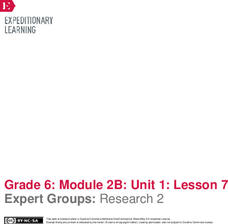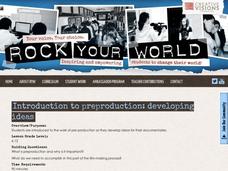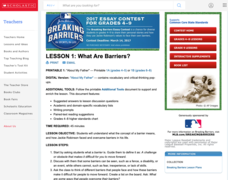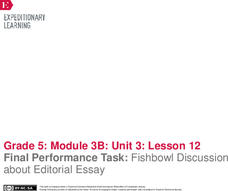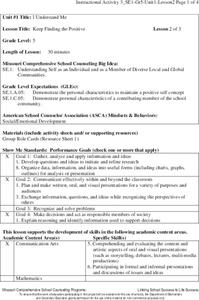EngageNY
Mid-Unit Assessment: Small Group Discussion: How Do Modern Poems Portray Modern Adversities?
How is a poem similar to and different from a news article? Pupils use a graphic organizer to compare and contrast the two genres. Also, as part of a mid-unit assessment, scholars participate in small-group discussions based on poetry...
EngageNY
Group Discussions and Revision: Editorial Essay
Great minds think aloud! Pupils participate in the Fishbowl protocol, discussing their opinions about the Mary River mine proposal. As they share their thoughts, peers provide feedback about their thesis and supporting ideas.
Great Books Foundation
Discussion Guide for 1984
George Orwell's Nineteen Eighty-Four, published in 1949, can seem strangely prophetic when compared to modern news events and politics. Readers of Orwell's dystopian classic sharpen their critical thinking skills by engaging in...
Teaching Tolerance
Where We Stand
Everyone is entitled to their own opinion. Academics learn strategies to share their opinions and agree or disagree with others in a respectful manner. The resource provides scenarios to help individuals form opinions and share them with...
EngageNY
Expert Groups: Research 2
Continue on. Scholars continue the research they began in their expert groups in instructional activity six. They read text and task cards from their research folders and share what they have gathered in research thus far. Individuals...
EngageNY
Mid-Unit 3 Assessments, Part 1: Summarizing, Analyzing and Discussing Research
Speak up and listen up. Scholars participate in a speaking and listening mid-unit oral assessment. They discuss whether their rules to live by should be a personal choice or made into a law, and then they complete an exit ticket to...
Creative Visions Foundation
Introduction to Pre-production: Developing Ideas
Continue with creating documentaries with the fourth lesson in a series. After explaining the concept of preproduction, send groups off to make some decisions about their films. Groups can use the handout and the four provided questions...
Journey of a Substitute Teacher
Group and Partner Posters
Partners and Groups become acronyms on these posters that encourage kids to respect others, stay on task, participate actively, ask questions, and more when working with others.
EngageNY
Connecting the Theme of the Expert Group Myth to a Theme in The Lightning Thief and to Life Lessons
Expert groups discuss the theme of their myths and the life lessons people learn from it. They then regroup their triads so that there is a pupil from each expert myth group and share details about their myths. The class also talks about...
Caucus 101
Linkage Institutions: Interest Groups: Option A
How are elections really run and won? Learn about special interest groups, super PACs, and lobbyists with an engaging lesson plan about the caucus process. Young voters research specific interest groups and analyze their part in previous...
Scholastic
Lesson 1: What Are Barriers?
Scholars discuss the concept of a barrier with a short passage on Jackie Robinson. The writing process begins with a paragraph and several other sentences about Robinson's unique traits that made breaking a barrier...
Teaching Tolerance
Parallels Between Mass Incarceration and Jim Crow
Is history repeating itself? A riveting lesson examines the parallels between mass incarceration in the U.S. and the Jim Crow Laws of the past. Academics review Jim Crow Laws and compare them to mass incarcerations of African Americans....
Teaching Tolerance
Dismantling Racial Caste
It's time to end racism. The final installment of the series encourages scholars to consider what is needed to ended the racial caste system in the U.S. Young historians complete group discussion, written prompt, and a hands-on-activity...
EngageNY
Final Performance Task: Fishbowl Discussion about Editorial Essay
Using the resource, learners share their essay revisions with a partner. Afterward, they participate in a Fishbowl discussion, receiving peer feedback about their editorial essays.
EngageNY
Mid-Unit 3 Assessments, Part 2: Summarizing, Analyzing and Discussing Research
Why is reading important? As part of the mid-unit assessment, scholars read, summarize, and analyze an article about the importance of reading. Additionally, they continue their discussion about whether their rules to live by should be a...
EngageNY
Reading about the Author’s Perspective: Why Do Authors Write about Natural Disasters?
It's all about perspective. Scholars view a note from the author in Eight Days. They determine the gist and discuss what they can learn about the author's background based on the note. They then complete a fishbowl activity in...
Missouri Department of Elementary
Keep Finding the Positive
Group members take on roles to create a positive classroom community. Learners perform their role—leader, recorder, presenter, timekeeper, encourager, and collector—in preparation for a formal presentation of their positive thinking...
Great Books Foundation
The Fox and the Stork
Young readers take part in a meaningful discussion following a reading of Aesop's fable "The Fox and the Stork." Five questions focus on the characters' actions and offering apologies.
Georgia Standards
Sociology Unit Six: Socialization Within the Group
How do we learn the rules of society? How do beliefs and ideas affect these rules? Introduce your young sociologists to the factors that socialize individuals with a unit that uses observation and experimentation to analyze how factors...
DocsTeach
Where Was the New Deal?
Young historians delve into the origin of federal social programs to understand the impact of the New Deal. An informative activity explores some of the New Deal programs, such as the Civilian Conservation Corp, using historical...
Teaching Children Philosophy
Tiger-Tiger, is it True?
Scholars take part in a philosophical discussion about truth, thoughts, and feelings following a reading of Tiger-Tiger is it True? by Byron Katie and Hans Wilhelm.
EngageNY
Building Background Knowledge: Small-Group Work to Learn More about the History of Wars in Vietnam
Scholars take a close look at "The Vietnam Wars." They answer questions and discuss in groups to conclude that the author respects the Vietnamese. They participate in a modified jigsaw discussion and end the exercise with a quick writing...
EngageNY
End of Unit 2 Assessment, Parts 1A and 1B: Fishbowl on Screen Time and Adolescents
Here's a surefire way to ensure that class discussions go swimmingly! Using the resource, scholars participate in a Fishbowl activity, forming two concentric circles in the classroom. As the group on the inside of the fishbowl discusses...
EngageNY
Expert Groups: Research 1
Be a team player. Scholars gather in their expert groups and discuss group norms and roles. They look at their research topics and determine how they will divide the work among themselves. Groups look over their research folders and ask...
Other popular searches
- Discussion Group
- Titanic Group Discussion
- Group Discussion Format
- Whole Group Discussion
- Small Group Discussions
- Group Discussion Activities
- Brief Group Discussion
- Short Group Discussion
- Chapter 6 Group Discussion
- Topics Group Discussions
- Business Group Discussions
- Book Discussion Group




